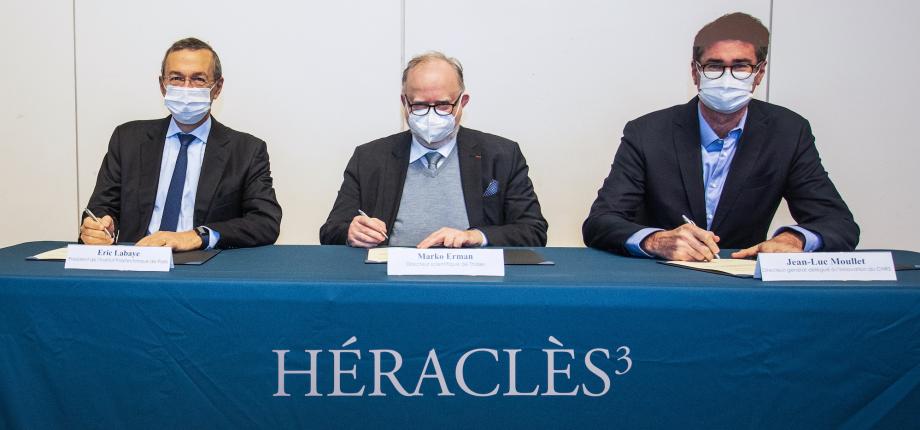HERACLES³: the first joint laboratory on intense lasers of IP Paris

The partnership was signed on the IP Paris campus by Eric Labaye, President of Institut Polytechnique de Paris and École Polytechnique, Jean-Luc Moullet, Deputy Director General for Innovation at CNRS, and Marko Erman, Scientific Director at Thales.
It highlights the common interests of the three signatories in power lasers, one of the major research areas of IP Paris and CNRS. These laser technologies and their applications are also in line with the strategy of Thales, a world leader in the field of scientific lasers, which focuses its laser activities on three sectors: space, scientific and industrial.
Several collaborations have emerged from these common interests, such as the XCAN project conceived by Nobel Prize-winning physicist Gérard Mourou, professor emeritus at École Polytechnique, or part of the R&D of the Apollon research infrastructure, with its lasers that are among the most powerful in the world, piloted by the Laboratory for the Use of Intense Lasers (LULI*), and, more recently, the facilities of the Laplace project for a Plasma Laser Acceleration Center, piloted by the Applied Optics Laboratory (LOA*).
The HERACLES³ Laboratory will enable the development of innovative technological building blocks, to increase and make more reliable the performance of laser sources, particularly in terms of power, intensity and repeatability. Certain fields of application such as electron acceleration, with a new class of gas pedals, or medical imaging at very high resolution and non-destructive testing of very thick welds, will be explored.
The laboratory will bring together dedicated teams from LOA and LULI* with researchers and support staff from CNRS and IP Paris. Thales will contribute to this project with its experts but also by financing CIFRE theses, lending equipment, and providing a new laser for the Laplace project, which aims to become one of the world's leading laser-plasma acceleration centers.
READ PRESS RELEASE (in French)
* LULI, Laboratory for the use of intense lasers, a CNRS / École Polytechnique - Institut Polytechnique de Paris / Sorbonne University laboratory
*LOA, Laboratory of Applied Optics, a CNRS / École Polytechnique - Institut Polytechnique de Paris / ENSTA Paris - Institut Polytechnique de Paris laboratory













